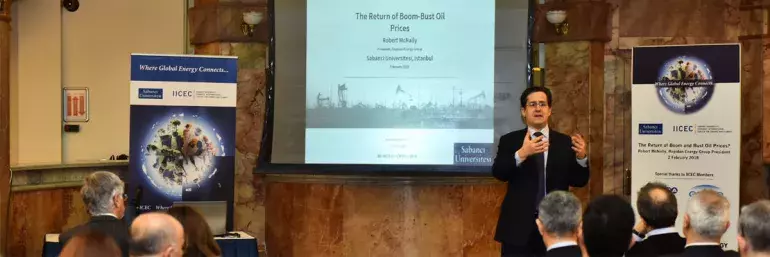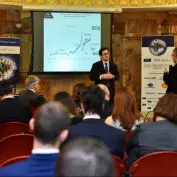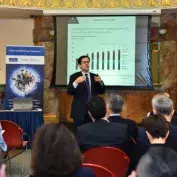
SEMINAR BY ROBERT MCNALLY “THE RETURN OF BOOM AND BUST OIL PRICES”
Sabancı University Istanbul International Center for Energy and Climate (IICEC), which promotes exchange of ideas and developments in energy and climate areas, continues to host important figures from these fields. Robert McNally gave a seminar titled as "The Return of Boom Bust Oil Prices” at Sabancı University Minerva Palas in Karaköy. McNally, consultant and President of the Washington-based energy market, policy, and geopolitical consulting firm Rapidan Energy Group, previously served as Senior Director for International Energy at the White House National Security Council.
"Price stabilization in oil is vital"
McNally began his presentation by saying that oil is the lifeblood of the modern world, he said, all economic dynamics are in fact dependent on oil prices. Therefore, fluctuations in oil prices had caused important problems for; growth indicators, central banks, air transport, military planning, etc.
McNally said that the fluctuations in oil prices are in the nature of oil and he expects unusual price fluctuations to continue, hence we must be prepared for this volatility. McNally explains that there has been need to take measures against price fluctuations since the 1860s when the modern era of oil production began to produce kerosene for lighting (to replace whale oil!). John Rockefeller established the first cartel to control oil prices by monopolizing the US refining and railroad industries and brought an end to the boom-bust oil prices that previously existed. This ended with the breakup of Standard Oil producing a new era of price instability until the Texas Railway Commission enforced production quotas on all Texas oil wells bringing another period of price stability until, in 1972, there was no longer any spare production capacity in Texas or the United States. Then OPEC stepped in as the new price regulator. When new oil supplies and falling demand arose in the 1980s, OPEC was unable to share production cuts among themselves leaving it to Saudi Arabia to accept all of the lost market share in attempting, by itself, to prop up prices. When they refused to do this any longer, they increased oil sales in 1986 and prices fell sharply. Since then, something new happened at the turn of the century. We have witnessed, almost for the first time, wide oil price fluctuations that have had nothing to do with supply outages. This new era of price instability has been devastating for the world’s economies after the relatively stable price trend from 1986 to 2002. Since then, there have been periods of relatively stable prices only to be interrupted by new swings, booms or busts. We have recently been in a period of relatively stable low oil prices but we should not assume that this can last indefinitely since the seeds for another boom have already been laid with reduced oil production investments as a result of low prices.
"Today's fluctuations are unusual; Be prepared for $20 - $150"
Indicating that the fluctuations in today's oil prices are not normal compared to previous periods, McNally said:
"Everyone is wondering what the ‘new normal’ is. Today's fluctuations are not normal. There are various expectations. The stability in the last 3 years is not deceiving. In terms of delicate balances of the market, it is necessary to be prepared for a new normal range of $20 to $150."
"Demand for petroleum-powered vehicles is high despite green policy"
McNally explains that the use of electric vehicles is going to increase, but this trend will not bring about peak oil demand. "States are setting very sharp targets that emphasize the use of electric vehicles and are taking steps to implement those targets. On the other hand, in very fast developing economies such as China and Central Asian countries, we see that oil-powered big vehicles are preferred over electric cars when we look at purchases, even if ‘green policies’ are emphasized. So, as these countries grow, petroleum demand increases."
Referring to the International Energy Agency's forecast of oil demand between 2015 and 2040, McNally noted that OECD countries are on a stable demand line, but the remaining countries have a growing demand. In conclusion he finished his presentation by stating: "I have doubts that we will use oil less."
After Mr. McNally’s informative presentation, a Q&A session leading to fruitful discussions was held. Technologies and Management (ETM) MSc students, energy industry executives, and high level representatives from energy related associations attended the event, and a cocktail followed the talk.









